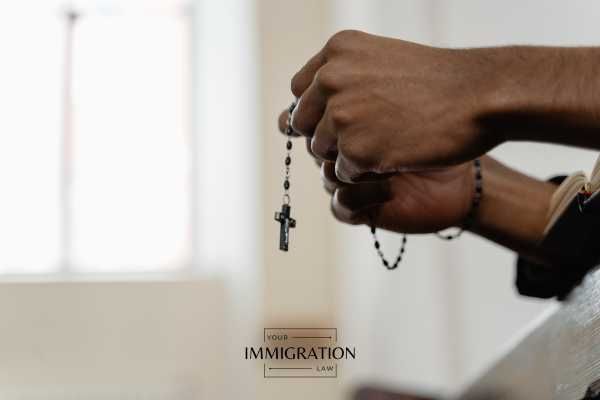The R visa allows foreign nationals to work in the U.S. temporarily in religious jobs, such as ministers, missionaries, and educators. This visa allows individuals to help their faith community while in the U.S. However, the application process requires careful documentation and strict adherence to U.S. immigration laws. A religious workers visa lawyer can help ensure that your application is thorough, accurate, and submitted on time.
Whether you are a religious organization seeking to sponsor a worker or an individual pursuing a religious role in the U.S., having legal guidance is key to a successful visa application. An immigration attorney can provide the support you need to navigate the entire process and fulfill your mission in the U.S. Call 313-631-8080 today to schedule a free consultation
Types of Religious Workers who can get an r-1 visa
The R-1 non-immigrant visa is for religious workers at U.S. non-profit religious organizations. Eligible R-1 workers include:
- Ministers: Individuals authorized by a religion to conduct worship and other clergy duties. This can include pastors, priests, rabbis, imams, or other religious leaders who are ordained or otherwise recognized as ministers.
- Religious Vocation Workers: These individuals have committed themselves to a religious way of life. Examples include monks, nuns, and other members of religious orders. Their roles are not necessarily tied to one specific task but rather involve devotion to the religious life and community in various ways.
- Religious Occupation Workers: These are individuals whose primary job involves carrying out religious duties. This can include religious instructors, counselors, and missionaries. It also includes liturgical workers and those involved in religious outreach or education. Their work must be connected to the religious functions of the organization and cannot be solely administrative or support-based.
- Cantors and Choir Directors: Individuals who lead or perform in religious ceremonies, guiding congregational singing or chanting as part of worship services. These roles are often central to religious worship and ceremony within various denominations.

This type of U.S. work visa is intended for religious workers whose duties are directly related to the religious beliefs and practices of their denomination.
How to Qualify for an R-1 Visa
To qualify for an R-1 religious worker visa, you must meet certain requirements. This visa allows religious workers to be employed by a religious non-profit organization. These basic requirements ensure that R-1 visa applicants and the sponsor meet the conditions. Here’s what you need to qualify:
- Religious Membership: You must be a member of a religious denomination that has a bona fide nonprofit religious organization in the United States. Additionally, you need to have been a member of this religious denomination for at least two years before applying for the visa.
- Religious Occupation: The work you intend to do in the U.S. must be in a religious capacity. This includes ministers, religious instructors, and other religious workers. They must perform primarily religious duties. The position cannot be purely administrative or unrelated to the denomination’s religious functions.
- Employment with a Nonprofit Religious Organization: Your visa must be sponsored by a U.S. nonprofit, tax-exempt, religious organization. It must be recognized by the IRS. The organization must provide evidence of its tax-exempt status when filing an R-1 visa petition.
- Intent to Work Part-Time or Full-Time: You must intend to work at least 20 hours per week for the religious organization. The R-1 visa allows for both part-time and full-time religious work, but your duties must be primarily religious and tied to the denomination's core functions.
- Temporary Stay: The R-1 visa is for religious workers coming to the U.S. on a temporary basis. You must prove you will return to your home country after your U.S. religious work. Your stay is granted for up to 30 months, with a possible 30-month extension. It is not a path to permanent residence.
By meeting these eligibility requirements, you can qualify for an R-1 visa and engage in religious work with a recognized U.S.-based nonprofit religious organization.
How long can I have R status?
An R-1 visa holder can stay in the U.S. temporarily to perform religious duties. Initially, R-1 status is granted for up to 30 months (2.5 years). If more time is needed, an extension can be requested for an additional 30 months. However, the total time spent in R-1 visa status cannot exceed 60 months (5 years).
After reaching the 5-year maximum, you must spend at least one year outside the U.S. before applying for a new R-1 visa, unless you are transitioning to a different type of visa or obtaining permanent residency.
What documentation do you need to apply for an R-1 visa?
To apply for an R-1 religious visa, you must prove your eligibility and the legitimacy of your work in the U.S. Here are the key documents needed for the application:

- Form I-129, Petition for a Nonimmigrant Worker: This form must be filed by the U.S.-based religious organization sponsoring your visa. Along with the form, the organization will need to provide supporting documentation.
- Proof of Religious Membership: You must submit evidence showing that you have been a member of your religious denomination for at least two years. This could include letters from religious leaders, membership records, or other documentation that verifies your religious affiliation.
- Job Offer from the Religious Organization: A formal job offer letter from the U.S. religious organization outlining your role and responsibilities. The letter should detail your religious duties, work schedule, and, if applicable, your pay.
- Proof of Nonprofit Status of the Religious Organization: The sponsoring religious organization must prove its tax-exempt, nonprofit status. This can be an IRS determination letter or other proof of its 501(c)(3) status.
- Financial Evidence: If the position is paid, the religious organization should submit documentation showing that it can compensate you. This could include financial statements or proof of the organization's ability to support your position.
- Religious Worker Qualifications: You may need to prove your qualifications, depending on the religious role. If you are applying as a minister, include your ordination certificates or letters from religious leaders verifying your status.
- Form DS-160, Online Nonimmigrant Visa Application: Once the Form I-129 is approved, you will need to complete the DS-160 form when applying for the visa at a U.S. embassy or consulate.
- Passport: A valid passport with an expiration date beyond your intended stay in the U.S. is required. Typically, your passport should be valid for at least six months past your expected stay.
- Visa Fee Payment Receipt: Proof that you have paid the required visa application fee.
- Additional Supporting Documents: At the visa interview at the U.S. embassy or consulate, you may need to provide more documents. These may include proof of ties to your home country, confirmation of your employment, or detailed evidence of your religious qualifications.
By ensuring all necessary documents are complete and accurate, you can help streamline the R-1 visa application process.
Conclusion
Securing a religious worker visa can be a complex process, but with the right support, you can focus on your mission while ensuring your application is handled properly. Don’t face the challenges alone.
Reach out to an immigration law firm today to get the assistance you need and start your journey toward making a meaningful impact in the U.S.